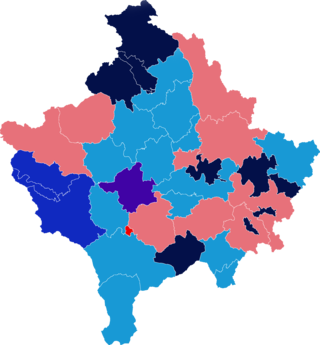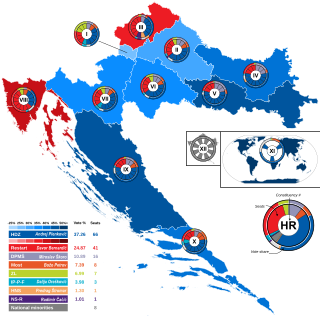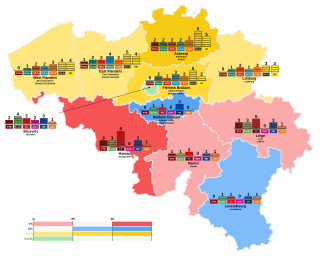| | |||||||||||||||||||||||||
| |||||||||||||||||||||||||
This lists parties that won seats. See the complete results below.
| |||||||||||||||||||||||||
Parliamentary elections were held in Serbia on 26 April 1886 to elect members of the National Assembly. [1]
| | |||||||||||||||||||||||||
| |||||||||||||||||||||||||
This lists parties that won seats. See the complete results below.
| |||||||||||||||||||||||||
Parliamentary elections were held in Serbia on 26 April 1886 to elect members of the National Assembly. [1]
A new government was formed in Serbia in early 1886. Attempts by Jovan Ristić to form a government failed after King Milan refused to dissolve Parliament on the grounds that it was not a good time to have a general election during the Bulgarian Crisis. [2] It was also thought that whoever controlled the government would be able to influence the election results. [2]
However, after Milutin Garašanin formed a government, the King granted his request to dissolve Parliament. [1]
The new Parliament opened in July. [3] Whilst Ristić could not be elected due to being in receipt of a government pension, his supporters won around 15 seats, with the remainder of the 78 opposition seats being held by members of the People's Radical Party. [3] Pro-government groups held 82 seats, although 40 of them were appointed by the King. [3] However, prior to the election of a new government, the incumbent government had several opposition members arrested or disqualified from voting, reducing them to 68 seats. [3]

The politics of Bulgaria take place in a framework of a parliamentary representative democratic republic, whereby the prime minister is the head of government, and of a multi-party system. Executive power is exercised by the government. Legislative power is vested in both the government and the National Assembly. The Judiciary is independent of the executive and the legislature.

Politics of Madagascar takes place in a framework of a semi-presidential representative democratic republic, with a pluralist multi-party system. The President of Madagascar is head of state and the Prime Minister of Madagascar is head of government. Executive power is exercised by the government. Legislative power is vested in both the government and the bicameral parliament, which is composed of the Senate and the National Assembly. The Judiciary is independent of the executive and the legislature.
A snap election is an election that is called earlier than the one that has been scheduled. Snap elections in parliamentary systems are often called to resolve a political impasse such as a hung parliament where no single political party has a majority of seats, or when the incumbent prime minister is defeated in a motion of no confidence, or to capitalize on an unusual electoral opportunity or to decide a pressing issue, under circumstances when an election is not required by law or convention.

The Dewan Rakyat, is the lower house of the bicameral Parliament, the federal legislature of Malaysia. The chamber and its powers are established by Article 44 of the Constitution of Malaysia. The Dewan Rakyat sits in the Houses of Parliament in Kuala Lumpur, along with the Dewan Negara, the upper house.

The National Assembly, fully the National Assembly of the Republic of Serbia, is the unicameral legislature of Serbia. The assembly is composed of 250 deputies who are proportionally elected to four-year terms by secret ballot. The assembly elects a president (speaker) who presides over the sessions.
The dissolution of a legislative assembly is the simultaneous termination of service of all of its members, in anticipation that a successive legislative assembly will reconvene later with possibly different members. In a democracy, the new assembly is chosen by a general election. Dissolution is distinct on the one hand from abolition of the assembly, and on the other hand from its adjournment or prorogation, or the ending of a legislative session, any of which begins a period of inactivity after which it is anticipated that the same members will reassemble. For example, the "second session of the fifth parliament" could be followed by the "third session of the fifth parliament" after a prorogation, but would be followed by the "first session of the sixth parliament" after a dissolution.

During the history of Canadian politics, thirteen minority governments have been elected at the federal level. There have also been two minority governments resulting from governments being replaced between elections, for a total of fifteen federal minority governments in thirteen separate minority parliaments. There have been historical cases where the governing party had fewer than half of the seats but had the support of independents who called themselves members of the party; these cases are not included, as there was never any serious chance of the government falling.
Elections in Malaysia include elections to public office of the political entities that since 1963 have composed the federation of Malaysia. At present, elections in Malaysia exist at two levels: federal level and state level. Federal level elections are those for membership in the Dewan Rakyat, the lower house of Parliament, while state level elections are for membership in the various State Legislative Assemblies. The heads of executive branch at both the federal and state levels, the Prime Minister and Menteri Besar/Chief Ministers respectively, are usually indirectly elected, filled by a member of the majority party/coalition in the respective legislatures.

Elections in Jordan are for the lower house, known as the House of Representatives, of the bicameral parliament of Jordan, as well as for local elections. They take place within a political system where the King has extensive legislative and executive powers, retaining ultimate political control. The Prime Minister is selected by the King, the PM is then free to choose his own Cabinet. The parliament has quotas: three seats for Circassians and Chechens, nine for Christians and fifteen for women. The electoral system favours rural tribes and those of East Bank origin over urban areas that are primarily inhabited by those of Palestinian descent.

The Council of Representatives is the de facto unicameral legislature of the Republic of Iraq. According to the Constitution of Iraq, it is the lower house of the bicameral legislature of the country. As of 2020, it comprises 329 seats and meets in Baghdad inside the Green Zone.
General elections were held in Nepal on 15 November 1994 to elect the House of Representatives. The election took place after the Nepali Congress government collapsed and King Birenda called new elections. The results showed that the Communist Party of Nepal won the most seats in the House of Representatives and Man Mohan Adhikari became Prime Minister at the head of a minority government.

The Alliance of Independent Social Democrats is a Serb political party in Bosnia and Herzegovina. Founded in 1996, it is the governing party in Republika Srpska, with its leader, Milorad Dodik, serving as the current president of Republika Srpska. The party's vice-president, Željka Cvijanović, is the current member of the Presidency of Bosnia and Herzegovina, while SNSD member Radovan Višković is the current prime minister of Republika Srpska.

General elections were held in Cambodia on 27 July 2003 to elect members of the National Assembly. The elections were won by the ruling Cambodian People's Party, which won a majority of 73 seats in the 123-seat parliament. However, due to the requirement for a two-thirds majority to elect a Prime Minister, a new government was not formed until July 2004 when a deal was reached with the FUNCINPEC party. Hun Sen was subsequently re-elected the post of Prime Minister.
Parliamentary elections were held in Serbia on 4 March 1888 to elect members of the National Assembly. The result was a "great triumph" for the People's Radical Party, which won a large majority of seats. Of the 142 seats in Parliament, supporters of Jovan Ristić won only 13.

Parliamentary elections were held in Kosovo on 8 June 2014, after incumbent Prime Minister Hashim Thaçi announced his intention to hold elections.

General elections were held in Cambodia on Sunday, 29 July 2018 to elect members of the sixth National Assembly. Polling stations opened at 07:00 and closed at 15:00. The number of registered voters has decreased for the first time since 1993 and was down 13% from the 2013 general elections.

Parliamentary elections were held in Croatia on 5 July 2020. They were the tenth parliamentary elections since the first multi-party elections in 1990 and elected the 151 members of the Croatian Parliament. 140 Members of Parliament were elected from geographical electoral districts in Croatia, three MPs were chosen by the Croatian diaspora and eight MPs came from the ranks of citizens registered as belonging to any of the 22 constitutionally recognized national minorities.

Federal elections were held in Belgium on 26 May 2019, alongside the country's European and regional elections. All 150 members of the Chamber of Representatives were elected from eleven multi-member constituencies.
Parliamentary elections were held in Serbia on 17 September 1887 to elect the 156 elected members of the National Assembly, with a further 52 appointed by the king.
Parliamentary elections were held in Serbia on 29 October 1878 to elect the elected members of the National Assembly. The result was a victory for the Liberal Party, who formed a government led by Jovan Ristić.